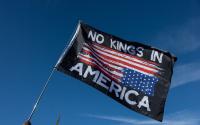22 July 2008The Independent
A Channel 4 documentary which claimed that the idea of man-made climate change was a fraud and a conspiracy has been censured by the broadcasting regulator. Ofcom.
The Great Global Warming Swindle, written and directed by Martin Durkin, misrepresented the views of the Government's former chief scientific adviser Sir David King, Ofcom said yesterday in a long-awaited judgement.
The programme was further found to have unfairly treated Sir David, the American oceanographer Professor Carl Wunsch and the UN's Intergovernmental Panel on Climate Change (IPCC) and to have breached the section of the Broadcasting Code relating to impartiality. But while accepting that the programme contained inaccuracies, and that there were "aspects of the presentation (and omission) of facts which caused some concern", Ofcom acquitted the broadcaster of "materially misleading the audience so as to cause harm or offence".
The 90-minute broadcast, in March 2007, created a stir because it attacked head-on the now generally accepted view that the warming of the Earth's climate – which is not in dispute – is being caused by man-made emissions of greenhouse gases such as carbon dioxide (CO2) from energy generation, industry and transport.
Since the fourth assessment report of the IPCC, published last year, this view has been accepted by all the world's governments, including the UK's. However, The Great Global Warming Swindle alleged, in terms which Ofcom described as "sweeping and intemperate", that this was not only inaccurate, but was in fact a deliberate falsehood.
Mr Durkin said in his narration: "Everywhere, you are being told that man-made climate change is proved beyond doubt. But you are being told lies." It was not human-produced greenhouse gases which were causing the climate to warm, Mr Durkin alleged, but solar activity, and in support of his case he produced a series of graphs and a number of scientists who backed his theory.
The programme suggested that researchers who maintained that humans induced climate change were doing so because it was the best if not the only way for them to secure research funds.
The regulator found that the programme misrepresented Sir David by having one of its participants, Professor Fred Singer, attribute to him opinions he had never expressed. It found that the way Professor Wunsch's contribution was used would have left viewers with the impression that he agreed with the premise of the programme – when he did not.
Ofcom said serious allegations were made against the IPCC without the UN body being given a proper opportunity to respond and it also found the programme to be in breach of the impartiality code by alleging that the climate change policies of Western nations were holding back development in poorer countries, without putting forward an alternative view.
The broadcast angered Britain's science community, from the Royal Society down, who accused Mr Durkin of distorting evidence and playing fast and loose with the facts.
Several people who took part said their views had been misrepresented, including Professor Wunsch, of the Massachusetts Institute of Technology, and Dr Eigil Friis-Christensen, the director of the Danish National Space Centre.
Ofcom received 265 complaints from members of the public, including a 176-page complaint from scientists and others which dealt with the script of the programme line by line, alleging, for example, that nine separate graphs used in the broadcast were inaccurate. There were separate complaints about unfairness from Professor Wunsch, Sir David and the IPCC.
Channel 4 denied the allegations, saying the programme was an "authored polemic", which sought to examine the debate over the cause of global warming and outline possible alternative causes. (The regulator has no jurisdiction over Mr Durkin and his production company, WAG TV.) The eventual Ofcom ruling can be seen as a split decision as, although the programme was rebuked for misrepresentation, unfairness and lack of impartiality, it was acquitted of the charge of misleading viewers – which many scientists thought was its main offence.
Ofcom explained that it had no mandate to judge whether what was said in the programme was accurate. The watchdog was required to set standards for "due accuracy" only in news programmes, and there was "no such requirement for other types of programming, including factual programmes of this type".
The regulator said it could only make a judgement under its standards which seek to protect members of the public from "offensive and harmful material", and on this basis, it did not find the programme misled the audience "with the result that harm or offence were caused".
Many of those who complained were unhappy with this. "Ofcom has dropped the ball by finding that the programme did not breach the Broadcasting Code with respect to standards of accuracy," said Bob Ward of the consultancy Risk Management Solutions, a former head of media at the Royal Society.
Professor Chris Rapley, the director of the Science Museum, said: "It [the programme] fell far short of the standards I would have expected of a public broadcaster." Sir David added: "The link between global warming and increased greenhouse gas emissions from human activities is now established beyond all reasonable doubt."
Ofcom's main findings
The Great Global Warming Swindle was found by Ofcom to have:
* Unfairly treated and misrepresented the views of the Government's former chief scientific adviser Sir David King by having one of its participants, Professor Fred Singer, attribute to him opinions he had never expressed.
* Unfairly treated the oceanographer Professor Carl Wunsch by using his contribution in a way that would have left viewers with the impression that he agreed with the premise of The Great Global Warming Swindle – when he did not.
* Unfairly treated the UN's Intergovernmental Panel on Climate Change (IPCC) by making criticisms of it without giving it a chance to respond.
* Breached the section of the Broadcasting Code relating to impartiality.
* While accepting that the programme contained inaccuracies, Ofcom acquitted it of "materially misleading the audience so as to cause harm or offence". Ofcom said that for most of its 90-minute duration the requirements of due impartiality did not apply to it. This was because for the first four of its five parts it did not deal with a "matter of political or industrial controversy" or matter relating to "current public policy". It added that the fifth part of the programme did and in this section no alternative views on the issues were presented.
Bête noire of the green movement
If the British green movement has a bête noire (or should that be a bête verte?)it is probably Martin Durkin, the independent television film-maker who has made a series of documentaries for Channel 4 which are highly critical of environmentalists and environmentalism – and of which The Great Global Warming Swindle is the most recent.
Dramatic, watchable, and unfailingly triggering public debate, all these programmes been lauded and excoriated in equal measure by supporters and opponents of the Durkin point of view, which could perhaps be paraphrased as seeing the greens not as the heroes and champions of justice he says they think they are, but as reactionary Western imperialists whose obsession with saving the planet makes them forget about saving the people, especially the poor in regions such as Africa.
There are far-left politics behind the Durkin stance. Durkin, a graduate from LSE and former financial journalist, has in the past been associated with the Revolutionary Communist Party, an offshoot of the Seventies and Eighties militant group International Socialism, and its magazine Living Marxism. He joined London Weekend Television in 1989 and 10 years later was running his own production company, WAG TV.
The Great Global Warming Swindle was welcomed by a number of right-wing commentators – strange bedfellows for someone with connections to Living Marxism – but sometimes the far right and the far left have much in common.






